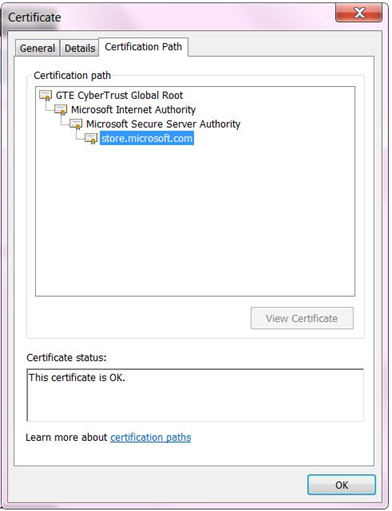Whom do you trust? Internet Explorer can help you decide
Like it or not, wariness is the watchword in cyberspace these days. There are just too many pranksters and other undesirable types who want our personal information, our money, or perhaps our signature on a Florida swampland deed of sale. Maybe all three.
So, yes, be careful—but remember, the good guys widely outnumber the not so good, and Internet Explorer 8 provides lots of hassle-free ways for you to protect yourself. Be sure to:
1. Look for the lock. When the lock ( ) symbol appears in the Internet Explorer address bar, it bodes well—it means the data you exchange with that page is encrypted, and harder for evildoers to hijack. You'll also notice that the site's URL begins with HTTPS instead of HTTP—that's “S for Secure.”
) symbol appears in the Internet Explorer address bar, it bodes well—it means the data you exchange with that page is encrypted, and harder for evildoers to hijack. You'll also notice that the site's URL begins with HTTPS instead of HTTP—that's “S for Secure.”
But criminals can use encryption, too, so look further.
2. Check with the authorities. Click on that  symbol and you'll see a Security Report, which shows who's vouching for the site.
symbol and you'll see a Security Report, which shows who's vouching for the site.

The kind of info you'll see varies—review the details—but, if the site is suspicious, Internet Explorer will issue you a warning. (Be aware, however, that the warning feature could be turned off.)
3. Ask someone you trust. Internet trust organizations certify sites that meet certain guidelines. Certified sites usually display a certification logo—but if you're unsure, check with the trust organization directly (visit TRUSTe, BBB Online, or WebTrust).
4. Check the fine print (ugh). If you haven't dealt with a web business before, read the website's privacy or terms of use statement.

Are you OK with a site storing your info, sending you email ads or sharing your info with its partners? Might as well know what you're getting into.
5. Don't get personal with just anyone. If a site wants your name, address, credit card number, or other personal info, make sure that  is displayed on the Internet Explorer address bar. No lock, no info.
is displayed on the Internet Explorer address bar. No lock, no info.
6. Look for real people. Good retailers aren't anonymous. If the site provides customer service details: a street address, a phone number, a reasonable return policy, etc., send them an email before sharing your info.
7. Ask around. Trustworthy sites are usually recommended—by your friend, or by a magazine or other organization you trust. If no one ever heard of the site, be cautious.
Finally, remember what my uncle always tells me: If it seems too good to be true, scurry off somewhere else. The Internet hosts an abundance of stand-up, trustworthy folk with whom you'll love doing business. Just make sure you've found them.
Jeff
